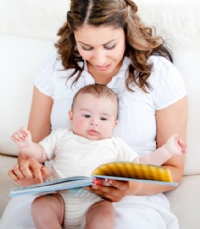The ABCs of Reading to Your Baby
By: Pamela Brill
One of the most underrated experiences of new motherhood can occur during the quietest of moments. Picture a freshly bathed, pajama-clad baby snuggled up in her mom or dad’s lap with a book in hand. Visualizing this scene is enough to calm even the most frenzied new parent.
“In the chaotic time of a newborn, this kind of closeness gives some quiet time for parents and their baby, not to mention some closeness,” says Carolyn Brodie, president for Library Service to Children, a division of the American Library Association (ALA), and a professor of library science at Kent State University in Kent, Ohio. Experts agree that reading with your baby is not only a great way to bond with them, but that it helps boost language development and can even go so far as to cultivate a lifelong love of books.
If the idea of reading aloud to your newborn seems a bit daunting or even overambitious, here’s how to get started.
Beginning to Read
How soon can you sit down with your baby and introduce her to Pat the Bunny? According to the experts, it’s never too early. “I believe that in utero is not too soon to read to your baby,” says Linda Trott Dickman, library media specialist for Norwood Avenue Elementary School in Northport, N.Y. “During the day, both of my girls heard me read from conception because of the work I do as a children’s librarian. Sometimes I would read to them at home when I wanted to test the sound of a new picture book I wanted to use in school.”
Once your baby is able to sit up, it’s an ideal time to turn reading into a regular routine. “You can open a book, point to a picture and talk about what you see,” offer Dorothy Singer, Ph.D. and retired senior research scientist with Yale University in New Haven, Conn. “It creates a nice bonding atmosphere and children will begin to associate books with warmth.”
As your child reaches 4-6 months of age, you can expect to see the effects of this shared experience. “They’ll begin to notice things like sharp images and shapes on the pages, and they’ll show more of an interest as they become aware of the world around them,” says Brodie. “Babies learn in every stage and books about their home, shopping, the playground, etc. can reinforce these experiences.”
]A Bounty of Benefits
Exposing your baby to books is beneficial to her overall development, both as an infant and through her formative years. In the short term, Dickman cites the positive impact on both parent and child. “[As you read], your baby gets used to the sound of a story, longer sentences and different vocabulary,” she says. “You as the parent get to perfect your reading, nuances and character voices.”
The more you read with your child, the more her vocabulary builds. “She’ll hear her first words and begin to understand that all stories have a beginning and an end,” notes Singer. In fact, many early learning advocates believe that children who were read to as babies thrive by the time they reach school age “Research shows that the earlier and more often you read to your child, the more prepared they’ll be to enter school,” says Jay Brown, a spokesperson for Reading is Fundamental. “Starting school ahead or on par with their peers makes a big difference in long-term success rates in school.” And while it may feel like kindergarten is a long way off, it certainly doesn’t hurt to put your child on the right track.
Socializing with Books
While reading may seem like a one-on-one activity, experts note that books can also play a part in strengthening a child’s social skills. Taking advantage of your local library’s story hour or other infant/toddler programming offers the advantage of experiencing books in a group setting. “It’s a wonderful way to teach that reading can be a social event,” notes Singer.
“Being part of a storytime means a deeper interaction with a book,” adds Brown. “Any activity that includes talking, listening, writing and reading will help a young child build their skills, and storytime is a great way to encourage all four interactions.”
Library programs are also instrumental for educating new parents. “The primary benefit is teaching behavior modeling: how to handle a book, how to do finger plays, how to teach nursery rhymes,” says Brodie. “Libraries are also one of the few public places where parents can socialize with other moms and similar-aged babies.”
Beginning Books
Before heading home, be sure to check out some books for you and your little one to enjoy together. One valuable resource for age-appropriate books is the ALA’s Born to Read list (http://www.ala.org/alsc/issuesadv/borntoread/masterbooklist). Other recommended titles include:
But Not the Hippopotamus by Sandra Boyton
Baby Shakespeare by Julie Aigner Clark and J. D. Marston
Harold and the Purple Crayon by Crockett Johnson
Moo, Baa, La La La by Sandra Boyton
Pat the Bunny by Dorothy Kunhardt
Prayers for Children by Eloise Wilkin
Goodnight Moon by Margaret Wise Brown
The Very Hungry Caterpillar by Eric Carle
Chicka Chicka Boom Boom by Bill Martin Jr. and John Archambault
Brown Bear, Brown Bear, What Do You See? By Bill Martin Jr. and Eric Carle
